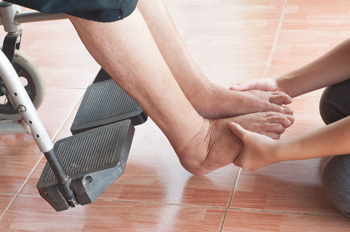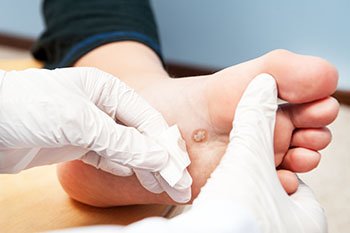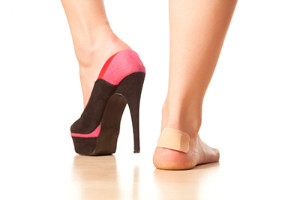Connect With Us
Blog
Items filtered by date: February 2022
Causes and Treatment for Plantar Warts
It is not uncommon for anyone who spends a lot of time at the gym or pool to develop plantar warts, or verrucae, on the bottom of the feet or around the toes. This condition is caused by the human papilloma virus (HPV) – a highly transmissible virus that loves moist, warm environments, such as locker rooms, shower floors, and swimming pool changing areas. The warts usually appear as a cauliflower-shaped growth with small dots. While they are basically harmless, they spread easily. Therefore, it’s a good idea to get rid of them as soon as possible. Because of this, patients who have a painful plantar wart, especially if it won’t go away on its own, would be wise to visit a podiatrist for treatment. Among the many options are removal with acid-based treatments, which are stronger than over-the-counter ointments, cryotherapy (freezing them off with liquid nitrogen), and laser surgery for larger clusters.
Plantar warts can be very uncomfortable. If you need your feet checked, contact one of our podiatrists from Garnet & Carbonell, DPM, LLC. Our doctors will assist you with all of your foot and ankle needs.
About Plantar Warts
Plantar warts are the result of HPV, or human papillomavirus, getting into open wounds on the feet. They are mostly found on the heels or balls of the feet.
While plantar warts are generally harmless, those experiencing excessive pain or those suffering from diabetes or a compromised immune system require immediate medical care. Plantar warts are easily diagnosed, usually through scraping off a bit of rough skin or by getting a biopsy.
Symptoms
- Lesions on the bottom of your feet, usually rough and grainy
- Hard or thick callused spots
- Wart seeds, which are small clotted blood vessels that look like little black spots
- Pain, discomfort, or tenderness of your feet when walking or standing
Treatment
- Freezing
- Electric tool removal
- Laser Treatment
- Topical Creams (prescription only)
- Over-the-counter medications
To help prevent developing plantar warts, avoid walking barefoot over abrasive surfaces that can cause cuts or wounds for HPV to get into. Avoiding direct contact with other warts, as well as not picking or rubbing existing warts, can help prevent the further spread of plantar warts. However, if you think you have developed plantar warts, speak to your podiatrist. He or she can diagnose the warts on your feet and recommend the appropriate treatment options.
If you have any questions please feel free to contact our offices located in Palmetto Bay, South Miami, and Homestead, FL . We offer the newest diagnostic and treatment technologies for all your foot and ankle needs.
Ways to Care For the Feet as They Age
 Over time, the feet begin to develop more problems due to everyday wear and tear. There is more stress placed on the joints in the feet, and the skin gets thinner and loses its elasticity. Because of the variety of debilitating foot issues that can occur with aging, it is important that elderly patients take care of their feet. Common issues that indicate aging feet include aches and pains, bunions, circulatory issues, and a curling up of the toes. Exercise, proper toenail trimming, moisturizing the feet, and wearing shoes that are supportive and that fit correctly are a few ways to minimize the effects of aging on the feet. Doing yearly checks with a podiatrist is another effective way to help care for the feet. A podiatrist can help detect a variety of issues that include diabetes and poor circulation, and they can help treat everyday foot problems like bunions and ingrown toenails.
Over time, the feet begin to develop more problems due to everyday wear and tear. There is more stress placed on the joints in the feet, and the skin gets thinner and loses its elasticity. Because of the variety of debilitating foot issues that can occur with aging, it is important that elderly patients take care of their feet. Common issues that indicate aging feet include aches and pains, bunions, circulatory issues, and a curling up of the toes. Exercise, proper toenail trimming, moisturizing the feet, and wearing shoes that are supportive and that fit correctly are a few ways to minimize the effects of aging on the feet. Doing yearly checks with a podiatrist is another effective way to help care for the feet. A podiatrist can help detect a variety of issues that include diabetes and poor circulation, and they can help treat everyday foot problems like bunions and ingrown toenails.
Proper foot care is something many older adults forget to consider. If you have any concerns about your feet and ankles, contact one of our podiatrists from Garnet & Carbonell, DPM, LLC. Our doctors can provide the care you need to keep you pain-free and on your feet.
The Elderly and Their Feet
As we age we start to notice many changes in our body, but the elder population may not notice them right away. Medical conditions may prevent the elderly to take notice of their foot health right away. Poor vision is a lead contributor to not taking action for the elderly.
Common Conditions
- Neuropathy – can reduce feeling in the feet and can hide many life-threatening medical conditions.
- Reduced flexibility – prevents the ability of proper toenail trimming, and foot cleaning. If left untreated, it may lead to further medical issues.
- Foot sores – amongst the older population can be serious before they are discovered. Some of the problematic conditions they may face are:
- Gouging toenails affecting nearby toe
- Shoes that don’t fit properly
- Pressure sores
- Loss of circulation in legs & feet
- Edema & swelling of feet and ankles
Susceptible Infections
Diabetes and poor circulation can cause general loss of sensitivity over the years, turning a simple cut into a serious issue.
If you have any questions please feel free to contact our offices located in Palmetto Bay, South Miami, and Homestead, FL . We offer the newest diagnostic and treatment technologies for all your foot and ankle needs.
Caring for Your Feet When You Have Diabetes
 Because diabetes can bring with it other problems, particularly in your feet, it is a good idea to pay special attention to their care. Symptoms to watch out for include numbness, tingling, and a feeling of pins and needles. In addition, inability to feel hot or cold, discoloration, and pain or burning sensations are common. It is especially important to be aware of cuts that are slow to heal and cracks in the skin. Conditions that can result from neglecting your feet include foot ulcers, bacterial or fungal infections, and swelling. Some home remedies include washing and carefully drying your feet daily, applying moisturizer on them to prevent cracking, and always wearing shoes indoors. By far the most cautious approach to your foot care is to schedule regular visits with a podiatrist who can examine your feet and offer any treatment that becomes necessary.
Because diabetes can bring with it other problems, particularly in your feet, it is a good idea to pay special attention to their care. Symptoms to watch out for include numbness, tingling, and a feeling of pins and needles. In addition, inability to feel hot or cold, discoloration, and pain or burning sensations are common. It is especially important to be aware of cuts that are slow to heal and cracks in the skin. Conditions that can result from neglecting your feet include foot ulcers, bacterial or fungal infections, and swelling. Some home remedies include washing and carefully drying your feet daily, applying moisturizer on them to prevent cracking, and always wearing shoes indoors. By far the most cautious approach to your foot care is to schedule regular visits with a podiatrist who can examine your feet and offer any treatment that becomes necessary.
Diabetic foot care is important in preventing foot ailments such as ulcers. If you are suffering from diabetes or have any other concerns about your feet, contact one of our podiatrists from Garnet & Carbonell, DPM, LLC. Our doctors can provide the care you need to keep you pain-free and on your feet.
Diabetic Foot Care
Diabetes affects millions of people every year. The condition can damage blood vessels in many parts of the body, especially the feet. Because of this, taking care of your feet is essential if you have diabetes, and having a podiatrist help monitor your foot health is highly recommended.
The Importance of Caring for Your Feet
- Routinely inspect your feet for bruises or sores.
- Wear socks that fit your feet comfortably.
- Wear comfortable shoes that provide adequate support.
Patients with diabetes should have their doctor monitor their blood levels, as blood sugar levels play such a huge role in diabetic care. Monitoring these levels on a regular basis is highly advised.
It is always best to inform your healthcare professional of any concerns you may have regarding your feet, especially for diabetic patients. Early treatment and routine foot examinations are keys to maintaining proper health, especially because severe complications can arise if proper treatment is not applied.
If you have any questions please feel free to contact our offices located in Palmetto Bay, South Miami, and Homestead, FL . We offer the newest diagnostic and treatment technologies for all your foot and ankle needs.
Giving the Boot to Foot and Ankle Injuries in Women
In the ice, snow, and cold of winter, women frequently will wear boots rather than shoes. But some boots may be more dangerous than others. Boots with high or spiked heels and pointy toes may put the wearer more at risk on slippery surfaces. If your ankle rolls inward or outward, it could result in a fracture. Twisting your ankle can cause a sprain – a torn or stretched ligament. To avoid winter foot injuries, try low-heeled boots with traction soles, and avoid wearing high-heeled shoes outdoors. If you have fallen and hurt your foot or ankle, it is a good idea to make an appointment with a podiatrist who can examine the injured area and recommend options for treatment.
High heels have a history of causing foot and ankle problems. If you have any concerns about your feet or ankles, contact one of our podiatrists from Garnet & Carbonell, DPM, LLC. Our doctors can provide the care you need to keep you pain-free and on your feet.
Effects of High Heels on the Feet
High heels are popular shoes among women because of their many styles and societal appeal. Despite this, high heels can still cause many health problems if worn too frequently.
Which Parts of My Body Will Be Affected by High Heels?
- Ankle Joints
- Achilles Tendon – May shorten and stiffen with prolonged wear
- Balls of the Feet
- Knees – Heels cause the knees to bend constantly, creating stress on them
- Back – They decrease the spine’s ability to absorb shock, which may lead to back pain. The vertebrae of the lower back may compress.
What Kinds of Foot Problems Can Develop from Wearing High Heels?
- Corns
- Calluses
- Hammertoe
- Bunions
- Morton’s Neuroma
- Plantar Fasciitis
How Can I Still Wear High Heels and Maintain Foot Health?
If you want to wear high heeled shoes, make sure that you are not wearing them every day, as this will help prevent long term physical problems. Try wearing thicker heels as opposed to stilettos to distribute weight more evenly across the feet. Always make sure you are wearing the proper shoes for the right occasion, such as sneakers for exercising. If you walk to work, try carrying your heels with you and changing into them once you arrive at work. Adding inserts to your heels can help cushion your feet and absorb shock. Full foot inserts or metatarsal pads are available.
If you have any questions please feel free to contact our offices located in Palmetto Bay, South Miami, and Homestead, FL . We offer the newest diagnostic and treatment technologies for all your foot and ankle needs.


